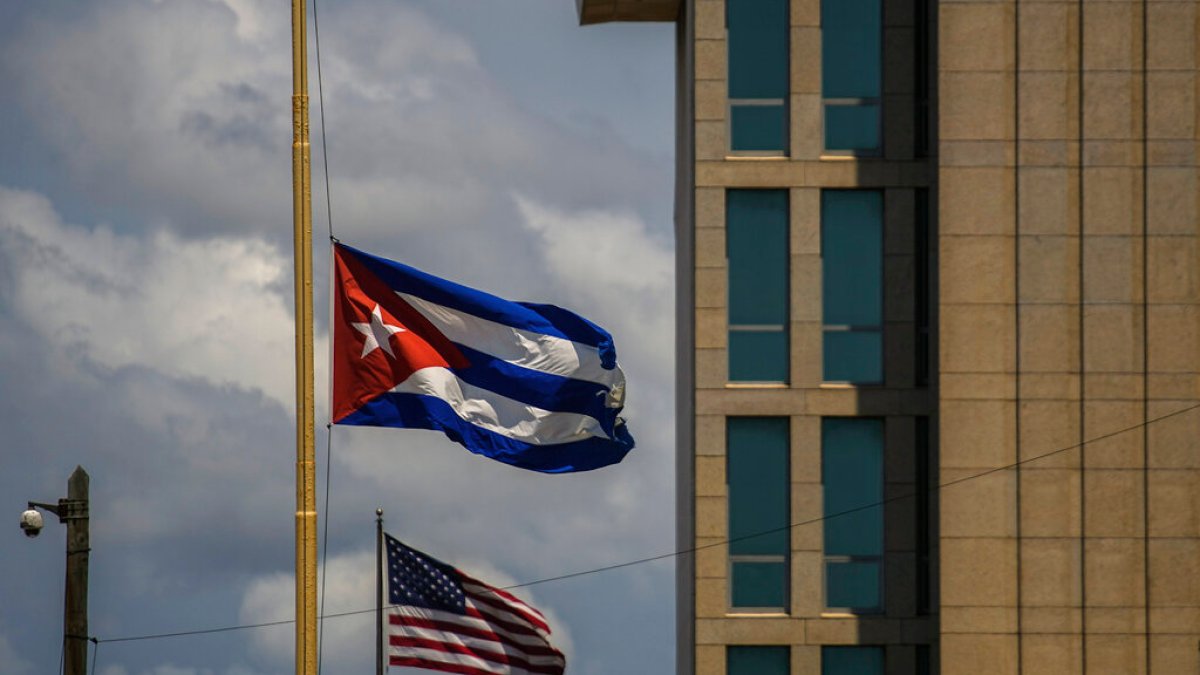Elite Afghan soldiers turn barbers, gym trainers in India to escape Taliban | Taliban
New Delhi, India – It is almost 5:40 in the evening. A hair salon in New Delhi’s bustling New Friends Colony neighbourhood is alive with the sound of buzzing clippers and chattering customers. The air is thick with the scent of hair spray and aftershave.
Zaki Marzai, 29, stands behind a barber’s brown chair, his hands moving with precision as he snips a customer’s hair.
Wooden shelves on the walls bear colourful bottles of shampoo and styling products. The mirrors reflect Marzai, his eyes focused on the hair before him. His customer looks satisfied.
Marzai, though, would rather be elsewhere – with a rifle in his hand, not a razor.
Three years ago, Marzai was a soldier in the elite special force of Afghanistan’s army, fighting the Taliban in a war that started with the United States and NATO forces invading the country in the aftermath of the 9/11 attacks. The Western-backed Afghan government had sided with the US in the 20-year war. Marzai joined the army in 2015 as a sergeant and was on track to become a commissioned officer.
Everything changed on June 20, 2018.
‘Sitting ducks’
At about 2am that day, Marzai was stationed outside a camp in Ghazni province of Afghanistan when a barrage of bullets hit him and his fellow soldiers.
Before Marzai and his comrades could realise what happened, 25 soldiers had died on the spot and six others had been injured. Bullets had pierced through Marzai’s chin and right leg.
“The attack was so intense we couldn’t do anything. The bullets were coming from all four sides. We were sitting ducks. The Taliban wiped out the entire camp,” he recalls. According to the United States Institute of Peace, an estimated 70,000 Afghan military and police personnel lost their lives in two decades of war in Afghanistan.
It was eight hours before any backup arrived to rescue the wounded. Marzai, who had lost a lot of blood, was first taken to a nearby hospital in Ghazni and soon transferred to a hospital in Kabul for further treatment on his jaw.
After nearly a year of treatment, his jaw was still deformed, so the Afghan government sent him to India for better care. He left behind his parents, a sister and seven brothers.
In 2019, Marzai arrived at a medical facility in Gurgaon, a city adjoining New Delhi. Later, he was also taken to two other public sector hospitals in the Indian capital.
By August 2021, Marzai hoped to return to Afghanistan, his face finally fixed. But the Afghanistan he knew was about to be broken.
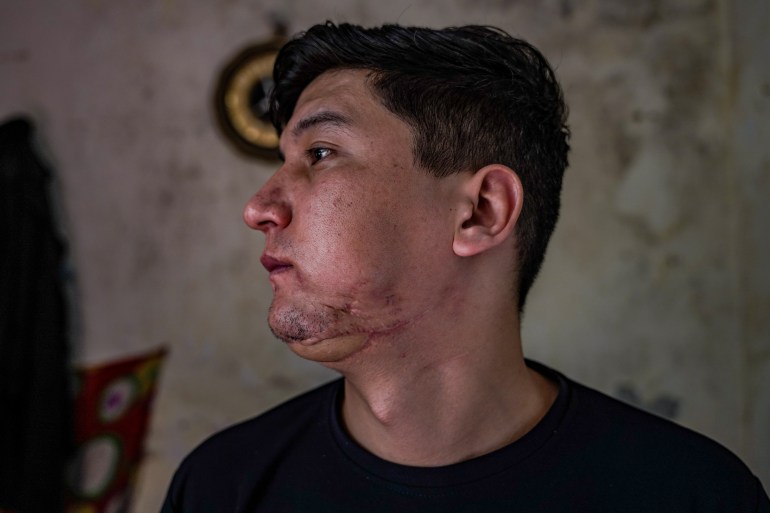
‘I cried all night’
As the Taliban grabbed control of province after province in Afghanistan in early August, Marzai was following the news on his phone, watching YouTube, tracking Twitter and waiting for Facebook updates.
Then, on August 15, the Taliban stormed into Kabul and took power, forcing the US and NATO forces to flee the country in a chaotic exit. Marzai tried to reach his family and soldier colleagues on the phone, but couldn’t get through because mobile networks were down.
He was stunned: Marzai had expected a fight, not a meek surrender from the country’s politicians, whom he accuses of looting Afghanistan and then escaping.
“I cried all night when the Taliban took over the country,” says Marzai. “I was heartbroken. I was looking forward to returning to my family and rejoining the army, but now I am stuck here [in India].”
Marzai is from Ghazni, an Afghan province dominated by the Shia Hazara community, which has been persecuted by the mainly Sunni Taliban for a long time.
And he is a former soldier for a government that the Taliban viewed as the enemy. Since August 2021, despite a general amnesty announced by the Taliban after its takeover, the United Nations Assistance Mission in Afghanistan (UNAMA) reported that at least 200 former Afghan soldiers and government officials have been killed extrajudicially by the new authority.
Marzai is not the only Afghan soldier in India, unable to return home.
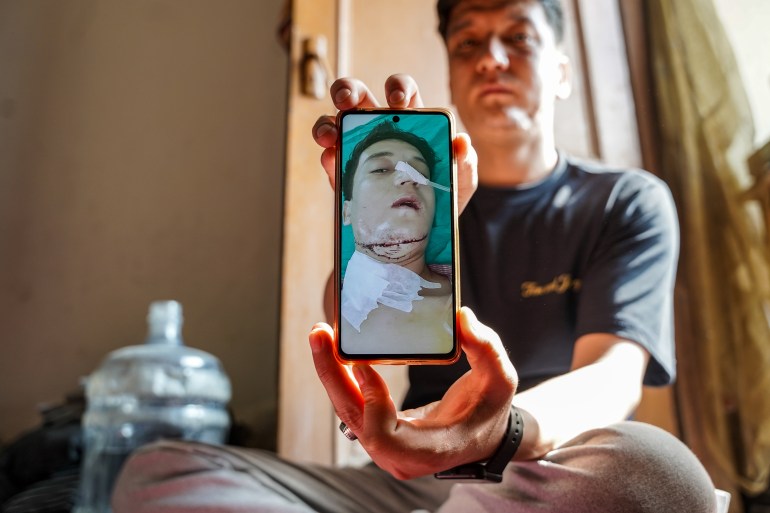
‘We couldn’t return’
Khalil Shamas, a 27-year-old former lieutenant who now works as a waiter at a New Delhi restaurant, arrived in India in 2020 for training at the elite Indian Military Academy (IMA) in Dehradun, the hilly capital of India’s northern state of Uttarakhand. By the time he and his colleagues completed the course, the Afghan army had ceased to exist on the ground.
He says there were about 200 Afghan soldiers training at the IMA. A few returned to Afghanistan. Many others migrated to Iran, Canada, the US and Europe.
But at least 50 of them stayed back in India – unable to get visas to the West, and too scared to return to Afghanistan.
Back in India, the difficulties for Afghan soldiers forced to stay in exile worsened after the Afghanistan embassy in New Delhi, their only source of contact and support, stopped funding their stay after the government in Kabul changed. The soldiers are reticent about sharing details of just how the embassy supported them financially.
“Since 2021, we have not received any help from the embassy. We have been left on our own, to fend for ourselves,” says Marzai.
After exhausting all of his savings and with no help coming, Marzai managed to enrol in a six-month haircutting course and started working in a salon.
He lives in a two-room apartment with a damp odour, with three other Afghan men in the congested Bhogal area of South Delhi. The paint is peeling off the walls, and dirty quilts are strewn about.
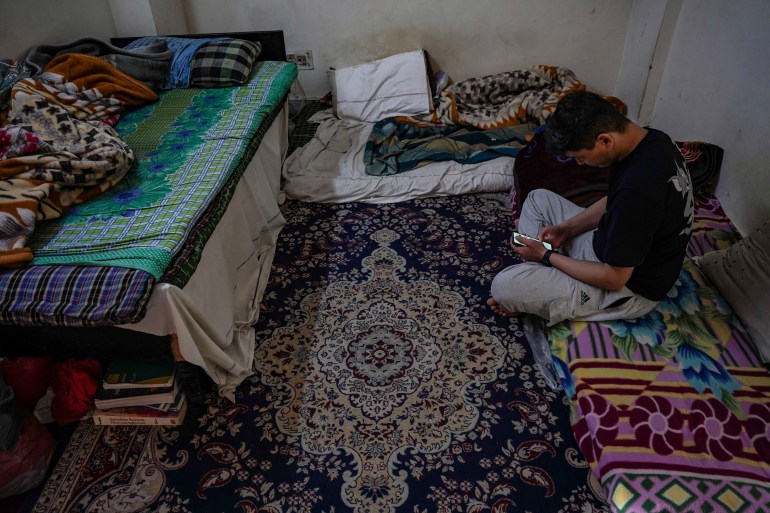
Not far from Bhogal, Shamas lives with seven Afghan friends in a small apartment in the city’s Malviya Nagar area. “It is challenging to live in a foreign land without any financial assistance from your government. I had to not only look after myself but also send money back home for my family,” he says.
Shamas’s older brother Dost Ali Shamas was a district governor in his hometown, Ghazi, when Taliban fighters killed him in an ambush in 2018. After the incident, the family moved to Kabul in search of a safer environment.
Since 2022, India has also slowly increased its engagement with the Taliban, a group it shunned when it was in power in the 1990s and when it was fighting US-backed forces between 2001 and 2021. In June 2022, the Indian government reopened its Kabul embassy and deployed a team of “technical experts” to manage its mission.
In November last year, the Afghan embassy in New Delhi, which was led by diplomats appointed by the elected government that the Taliban overthrew, announced that it was shutting down, accusing the Indian government of no longer cooperating with it.
Now, in addition to no longer receiving financial support from the mission, the Afghan soldiers also have nowhere to go for paperwork to authenticate that they were once part of their country’s army.
According to a 2023 report by the UN High Commissioner for Refugees (UNHCR), India is home to more than 15,000 Afghan refugees. Nearly 1,000 of those are Afghans who took shelter in India after the Taliban came to power in 2021.
The report says nearly 1.6 million Afghans have fled the country since 2021, bringing the total number of Afghans in the neighbouring countries to 8.2 million.
Among them is Esmatullah Asil.
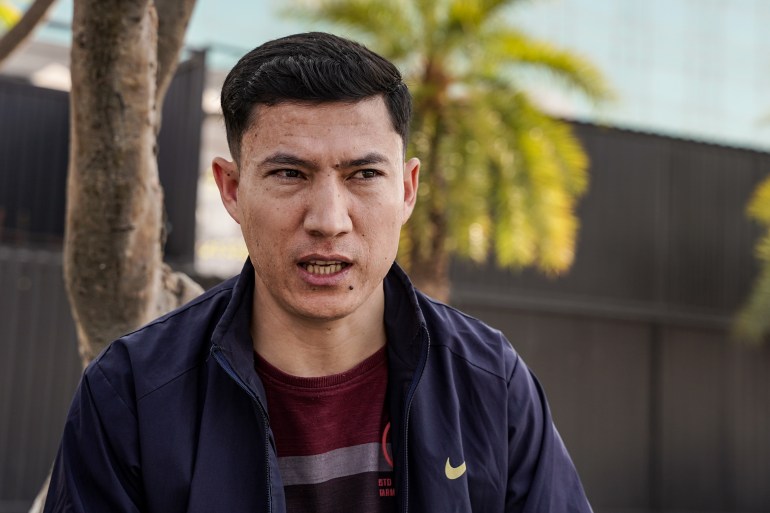
‘My dream came crashing down’
Asil, another former Afghan soldier, begins his day at 7am. Dressed in a black sports T-shirt and trousers, he hurries to work where young boys and girls wait for his instructions.
Asil, 27, is a gym trainer in South Delhi’s Lajpat Nagar, home to hundreds of Afghan migrants who have opened restaurants, shops and pharmacies there.
After finishing his master’s degree in social science from Herat University in western Afghanistan, Asil enrolled in the army and was set to become a lieutenant. “It was my dream to join the army and serve my country. But after the Taliban returned, my dream came crashing down,” he says.
While at the IMA, Asil used to visit the academy’s gym, where he learned bodybuilding. It was a skill that came in handy when he then sought work at the Lajpat Nagar gym.
“I told the gym owner to give me a chance and worked there for free for six months. If I hadn’t secured the job, I don’t know how I would have survived here,” he says.
The former Afghan soldiers in India say they are afraid of returning to Afghanistan – they fear they will be targeted for supporting the US-led NATO forces.
Shamas, whose brother was killed by the Taliban, recounts the threats that preceded that assassination.
“My brother received numerous threatening letters from the Taliban demanding to quit his position before they ultimately killed him,” Shamas recalls.
Marzai has his own demons.
He says he still wrestles with nightmares from the “harrowing night” he was ambushed. He instinctively moves his hands and legs in sleep, as if trying to evade the bullets that rained on him years ago.
“I sleep alone in a separate room. My roommates are reluctant to sleep beside me. I don’t know whom I will hit in my sleep because I move unconsciously,” he says.
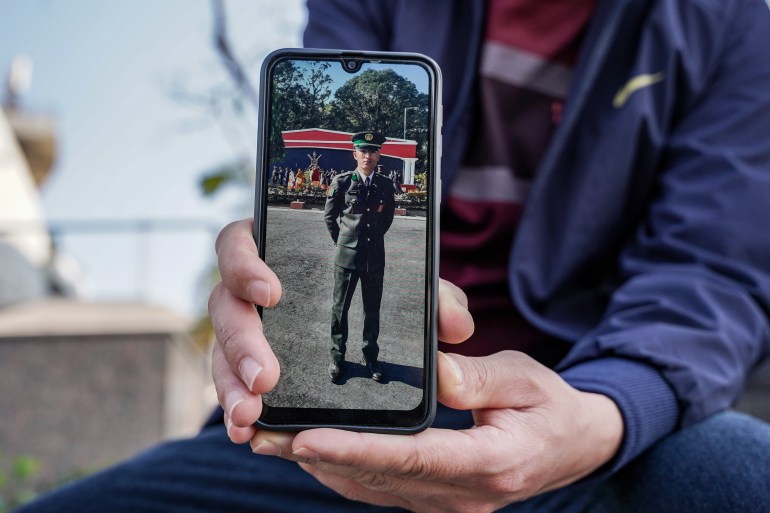
‘Never tastes like home’
In their free time, Asil and Shamas visit each other’s homes, recalling with nostalgia their days of hope and dreams at the IMA, where they first met. Conversations often end up veering towards the state of present-day Afghanistan – and the realisation that they need to distract themselves.
“We usually play cards, listen to songs – Afghani and Bollywood – watch movies on Netflix, and on occasions also cook,” Asil says. “My favourite actor is Shah Rukh Khan, and actress is Deepika Padukone,” he adds, laughing, referring to the Bollywood stars.
They cook their favourite dishes. Asil prefers kebabs and ashak, pocket-sized dumplings filled with chives, and typically served with yoghurt and a mint seasoning. Shamas has a weakness for kabuli pulao.
“We try our best to cook our favourite dishes. But it never tastes like home,” Shamas said.
And the delicacies of home can’t fill the void of missing out on family functions.
Shamas’s niece got married in early March, while Asil’s brother was married five months ago. One of Marzai’s older brothers got married in 2022.
“I desperately wanted to be there as my brother is no more. But, I couldn’t travel. I watched the wedding through a video call,” Shamas says.
Shamas and Asil want to migrate to the US. However, their lack of active service in the Afghan army makes them ineligible to seek asylum, they say.
“Because we were still in training and had not yet joined the army in active duty, the US authorities are not considering us for asylum despite the dangerous conditions we face in Afghanistan,” says Shamas.
According to the International Rescue Committee, up to 300,000 Afghans had been associated with US operations in Afghanistan since 2001. Since the withdrawal of the US, approximately 88,500 Afghans have been resettled in the US, according to the US Department of Homeland Security, while thousands more have applied, seeking asylum.
Asil is trying to move to other countries as well. “Let’s see what God has in store for me. I have no plans to return to Afghanistan. I want to settle in any Western country and later bring my family there as well,” he says.
Marzai is trying to get asylum in Europe or the US. “I am worried about my family. I want to go home but I am afraid of the Taliban. I am hoping that as a serving soldier, I will find a home in the West,” he said.
But for now, they must stay in India. And while the Afghan army they once served no longer exists, they can’t get rid of the habits they picked up over years of training.
Whenever Marzai meets a senior ex-officer, he maintains the same routine of discipline and respect he had been trained in, lowering his head and standing at attention while greeting the officer.
In Marzai’s head, he’s still a soldier.
Check out our Latest News and Follow us at Facebook
Original Source



